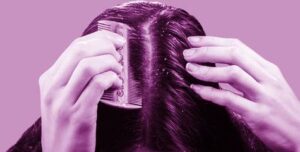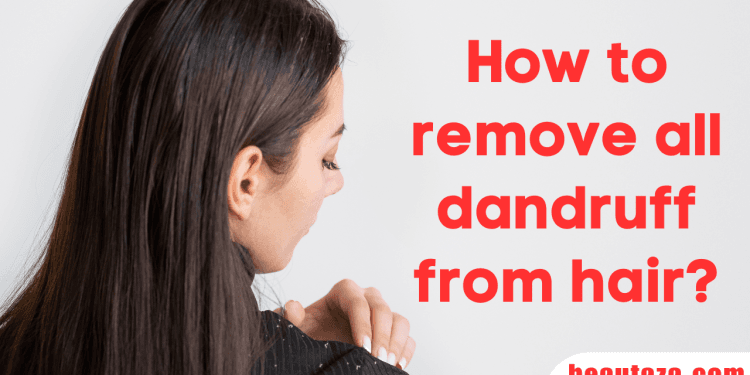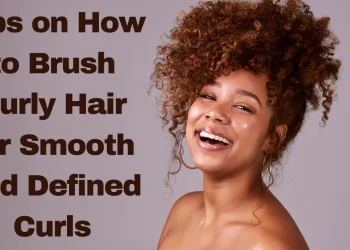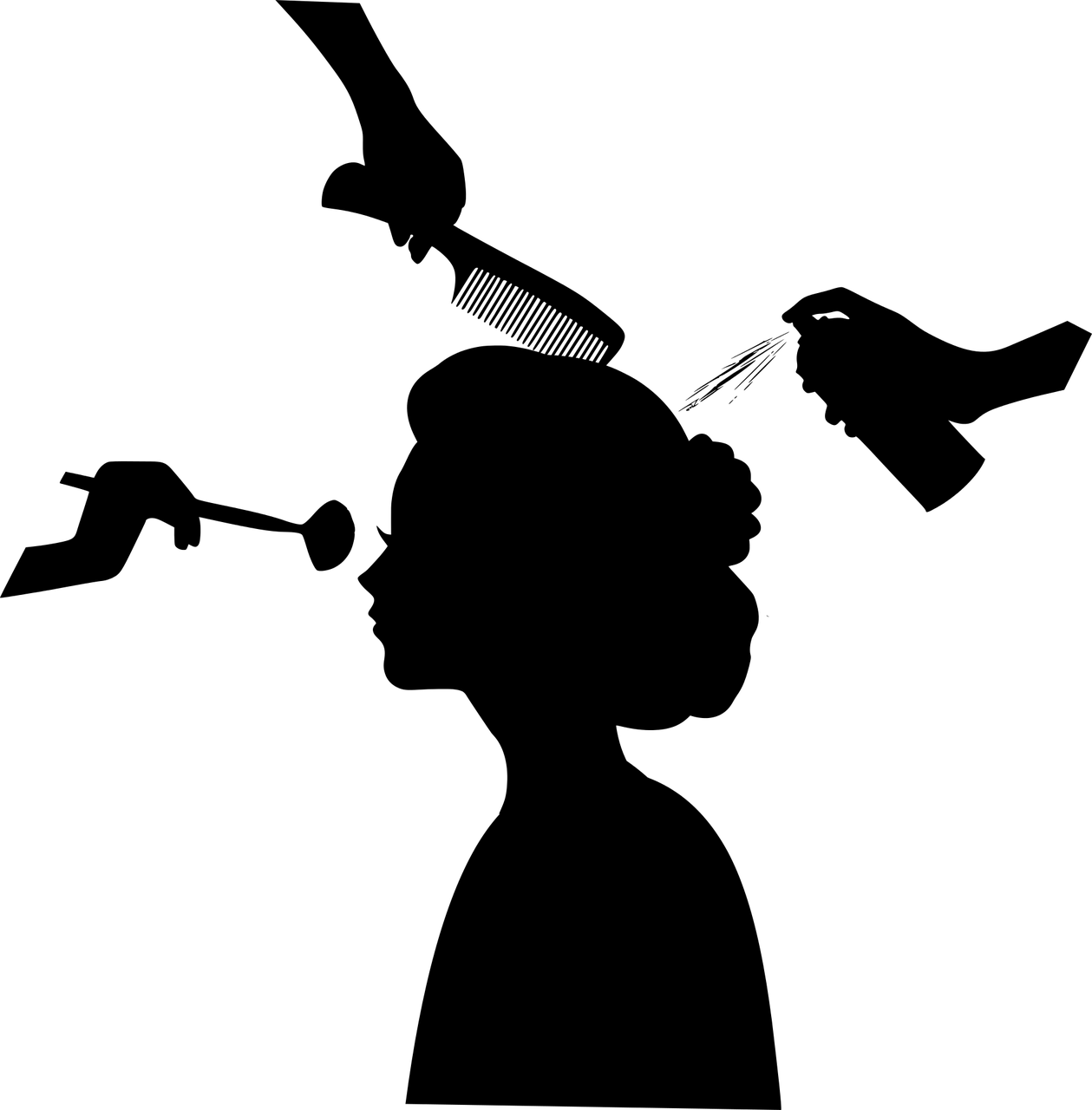
A typical hair issue that may be difficult to manage is dandruff. But there are some techniques to get dandruff out of your hair. This blog article will discuss How to remove all dandruff from hair?
Use Anti-Dandruff Shampoo
A standard and efficient method for removing dandruff from hair is anti-dandruff shampoo. The market is flooded with several anti-dandruff shampoos, so choosing one with substances like salicylic acid, ketoconazole, or selenium sulfide is critical. These components aid scalp exfoliation and slow the yeast development that causes dandruff. The finest anti-dandruff shampoos are Dove Dermacare Scalp Anti-Dandruff Shampoo, Head & Shoulders Clinical Strength Dandruff Defense Shampoo, Neutrogena T/Sal Therapeutic Shampoo, and Nizoral Anti-Dandruff Shampoo. Following the shampoo’s instructions on the bottle is crucial, and massage it into your scalp for a few minutes before washing it out. Regular use of anti-dandruff shampoo may prevent the recurrence of dandruff.
Are there any side effects of using anti-dandruff shampoo
Although most anti-dandruff shampoo side effects are minor and don’t affect everyone, they may occur. Following are a few possible adverse effects of anti-dandruff shampoo:
Skin Irritation: After using an anti-dandruff shampoo, some persons may have skin irritation, including redness, itching, or a rash. Sensitivity to the shampoo’s components may be the cause of this.
Shampoos for dandruff can make the scalp or skin dry or oily. This might change depending on the person and the particular shampoo being used.
Temporary Hair Loss: Occasionally, people who use anti-dandruff shampoo may have temporary hair loss. Since the hair typically grows back after using the shampoo no longer, this is usually of little issue.
Hair Discoloration: Using anti-dandruff shampoo may cause hair discoloration, mainly if the shampoo is not properly washed off. Carefully washing the hair after each treatment helps lessen this.
Other infrequent adverse reactions to anti-dandruff shampoo may include eye irritation, acne, skin inflammation (dermatitis), over-sensitivity responses, and general allergic reactions.
Use Baking Soda
A natural exfoliator, baking soda may assist in removing dandruff from hair. Here are several techniques for eliminating dandruff with baking soda:
Olive oil and Baking Soda: Combine the two ingredients to make a paste. After applying the paste to your scalp, please wait 20 minutes before washing it with warm water.
Lemon Juice and Baking Soda: Combine the two ingredients to paste. Apply the paste to your scalp, let it sit for a little while, and then rinse it with warm water. Natural astringents like lemon juice may aid in killing the fungus that causes dandruff.
Apple cider vinegar and baking soda: Combine the two ingredients to paste. Apply the paste to your scalp, let it sit for a little while, and then rinse it with warm water. The scalp’s pH is balanced by apple cider vinegar, inhibiting the yeast development that causes dandruff.
Mint juice with baking soda: Combine the two ingredients to make a paste. After applying the paste to your scalp, please wait at least 30 minutes before washing it with warm water. Since mint juice has antifungal characteristics, it may aid in dandruff removal.
Coconut oil with Baking Soda: Combine the two ingredients to make a paste. Apply the paste to your scalp, let it sit for a little while, and then rinse it with warm water. Dandruff may be removed with the use of coconut oil’s antifungal qualities.
What are the benefits of using baking soda for hair?
Numerous advantages of baking soda for hair include:
Cleaning: Baking soda assists in clearing away any accumulation of oils, soaps, and other substances contained in typical hair care products. Baking soda may leave hair gleaming clean, bright, and silky by removing this accumulation.
Increasing Shine: Baking soda may increase shine in straighter hair types by removing the buildup.
An alkaline substance like baking soda adjusts the scalp’s pH to keep it clean and healthy.
Reducing Oiliness: Baking soda absorbs extra sebum generated by the scalp, which helps decrease hair’s oiliness.
Cleaning the scalp with baking soda and absorbing extra sebum might help eliminate dandruff and flaky scalp.
Use Lemon Juice
Because lemon juice contains citric acid, which is a good treatment for dryness and dandruff, using lemon juice for dandruff might be advantageous. Here are some methods for treating dandruff with lemon juice:
Direct Application: Apply diluted lemon juice to your scalp and hair directly, enabling it to reach the roots of your hair. After letting it sit for a time, gently wash it off.
Honey and Lemon Juice: Combine three teaspoons of honey and one tablespoon of lemon juice. Apply the mixture to your scalp, and after 20 minutes, rinse it off with water.
Tea and Lemon Juice: Combine two teaspoons of chai patti or tea powder with half a cup of boiling water. Add a teaspoon of lemon juice after straining the decoction and letting it soak.
What are the benefits of using lemon juice for hair besides dandruff treatment?
Additional to curing dandruff, lemon juice has many other advantages for hair. The following are some advantages of putting lemon juice on hair:
Encourages Hair Growth
Vitamin C, which is abundant in lemon juice, may aid in increasing collagen formation. As a result, hair growth is guaranteed. Lemon’s acidity also clears blockages and awakens dormant hair follicles.
restores pH equilibrium
Citric acid helps regulate the scalp’s pH. Controlling the scalp’s oil level and preventing it from becoming overly greasy or dry works with lemon juice’s astringent impact to prevent dandruff.
Adds Glow:
Lemon juice may add shine and gloss to hair. This is due to citric acid, a natural clarifying agent in lemon juice. Lemon juice’s acidity flattens the cuticles, removing frizz and enhancing shine.
Reduction of Oiliness
Lemon juice may aid by absorbing extra sebum generated by the scalp, which in turn helps to lessen the oiliness of hair.
Intensive Cleaning
Lemon juice may eliminate product, oil, and filth buildup, thoroughly clean the scalp and hair follicles, and restore healthy pH.
Use a Scalp Massager Brush
There are several advantages to using a scalp massager brush for your hair and scalp. The following are some advantages of utilizing a scalp massager brush:
Exfoliation: A scalp massager brush aids in the removal of dead skin cells, product buildup, and extra oil from the scalp. This may help avoid blocked hair follicles and encourage a healthy scalp.
Increased Circulation: The brush’s massaging motion promotes the scalp’s blood flow. The hair follicles are nourished by increased blood flow, encouraging better hair development.
Hair Growth: A scalp massager brush may aid in promoting hair growth and fortifying the hair roots by enhancing blood flow and stimulating the hair follicles.
Stress reduction and relaxation: Using a scalp massager brush may be calming. A sensation of relaxation and well-being may be aided by the massage motion, which can also assist in releasing tension and lessen stress.
Product Absorption: Brushing the scalp may improve product absorption by distributing hair care products evenly throughout the scalp and hair strands.
Using a scalp massager brush regularly may assist in avoiding dandruff by encouraging a clean, healthy scalp. The brush’s exfoliating action helps remove flakes and lessen the accumulation of dead skin cells.
Use Ayurvedic Remedies
Ayurvedic hair loss, growth, and dandruff treatments may be successful. Here are some Ayurvedic hair care tips:
Shirodhara: This Ayurvedic procedure includes drizzling heated oil on the head to promote blood flow to the nerve endings and stop hair loss.
Shiro Abhyanga: This Ayurvedic head massage may increase blood flow and encourage new hair development.
Shirolepa hair pack: This Ayurvedic hair pack might assist in hydrating the hair and encourage hair development.
Herbs: To stop hair loss and encourage growth, Ayurveda advises using herbs like bhringraj, neem, ashwagandha, amla, soap nuts, and fenugreek.
Hair cleansers: Amla, henna, and fenugreek, among other natural components included in Ayurvedic hair cleansers, may assist in clearing the scalp and encourage hair growth.
Oiling: To feed the scalp and hair follicles, Ayurveda advises frequently oiling the hair. Massage with warm oil may increase blood flow and encourage hair growth.
Herbal hair masks: Nutrient-rich hair masks may be made with Ayurvedic herbal powders like Amalaki, henna, fenugreek and solvents like egg white and aloe vera gel. You may apply these masks from the roots to the tips of your hair and let them on for 30 to 40 minutes before washing them off with water.
Conclusion
In conclusion, dandruff may be a troublesome hair issue, but several techniques exist to eliminate it. To eliminate dandruff, try using an anti-dandruff shampoo, baking soda, lemon juice, a brush that massages the scalp, or Ayurvedic treatments. And remember to adhere to straightforward advice to prevent dandruff.
Read –










